FGM/C in California – Past, Present, and Future

The California Coalition to End FGM/C is hosting a webinar titled, “FGM/C In California – Past, Present, and Future” Date: Friday, October 11th Time: 12:30 – 1:45 pm ET / 9:30 – 10:45 am PT Registration: https://bit.ly/CAcoalitionwebinar Zoom: https://us02web.zoom.us/j/89895243890?pwd=Y6iLxQmEV1OHv77XbSa8XbrSvbgvYa.1 Description: The webinar will be held like a town hall, giving participants the chance to learn in a safe space about the topic of female genital mutilation (FGM/C) through an interactive dialogue. Speakers will include Sahiyo U.S. Executive Director Mariya Taher; Shivangi Mirsa of Equality Now; Senait Admassu and Athia Carrim of the Greater LA FGM Task Force and African Coalition; and Orchid Pusey of the San Francisco Asian Women’s Shelter. Participants will discuss the shortcomings of the current law in California, which was written back in 1996. The coalition will also lay out how the legislation needs to be amended in order to create culturally sensitive and cognizant prevention and support programs to support survivors and those at risk of FGM/C. This Roundtable is an opportunity to share and learn from survivors, advocates, service providers, and community members on the topic of FGM/C and the work being done to address the issue. Furthermore, this event will seek to connect with California legislators who are accountable for upholding and addressing various components of the original 1996 FGM/C law. Through engaging narratives and open conversation, this webinar will help to garner support in building a greater California coalition to end FGM/C that can better advocate for strengthening existing laws on FGM/C in the State. Register for the webinar here. [youtube url=”https://www.youtube.com/watch?v=HTAZ0vrd0cg”]
Sahiyo U.S. Releases New Impact Report: Policy Outreach, Education, and Advocacy Program
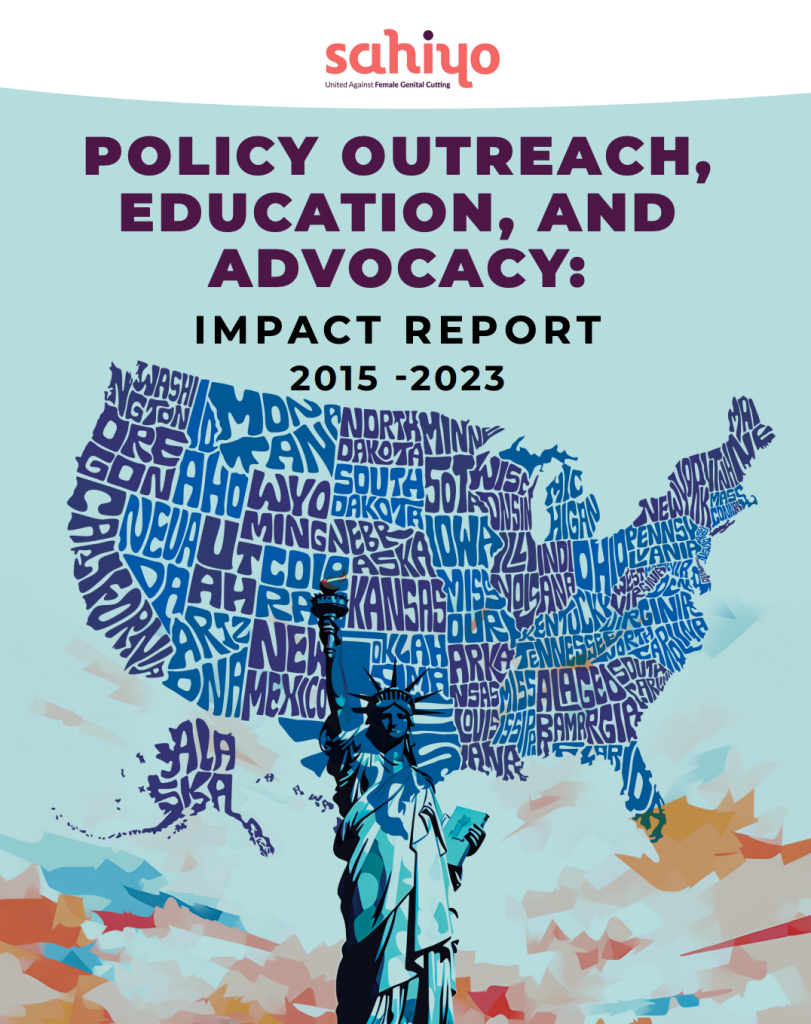
Policy work has been central to Sahiyo’s goal to end the practice of FGM/C and find ways to support survivors since our founding in 2015. Thus, Sahiyo U.S. is proud to publish, “Policy Outreach, Education, and Advocacy: Impact Report 2015-2023”, our newest report that reviews the work that Sahiyo U.S. has carried out and partnered with other organizations at the global, national, state, and local levels in geographies such as Massachusetts, Connecticut, Washington, Michigan, and New York City. Take a look at some of the highlights: Why We Engage in Policy Work: We recognize that to end FGC and support survivors, policies must be informed by and created in partnership with communities impacted by FGC. FGC is considered a social norm in practicing communities, and laws against FGC may help to prevent the practice by acting as a mechanism to shape the behavior of communities or individuals. Policies can be educational tools, deterrents, and influencers for psychosocial change. In guiding the creation of laws, communities can begin to realize that harmful practices – even those perceived to be steeped in culture and/or religion – should not be perpetuated. Furthermore, research indicates that to achieve maximum impact, policies should be developed holistically. This involves integrating community education and outreach components, alongside civil remedies for survivors, rather than relying solely on criminalization which does not fully address the larger goal of ending the practice. Policy Program Goals: Here are Sahiyo’s goals for our advocacy work: Educate frontline professionals (i.e. healthcare providers, social workers, childcare professionals, etc…), lawmakers, and constituents while also engaging them to support policies addressing FGC. Unite diverse stakeholders and establish shared concerns and connections related to FGC, fostering a collective impact and the creation of state-level coalitions dedicated to advocating for policy changes that address FGC. Uplift and include the voices of survivors in educating policymakers. Increase individual civic engagement in the legislative process and ensure that impacted communities have a voice in the creation of policies in order to prevent FGM/C and support survivors. By the Numbers: Program Impact from 2016-2023 3 state coalitions were formed. 2 states passed new legislation on FGC. 1 website was created for the Connecticut Coalition to End FGM/C. 2 Facebook pages were created for the Washington Coalition & Connecticut Coalition. 58 educational meetings held with legislators. 19 educational outreach webinars related to policy were hosted. 42 policy-related blog posts were posted on Sahiyo’s website. 2 action alerts created in partnership with UNICEF USA & Equality Now. To learn more, read the full report here.
Sahiyo U.S. Engages Community Stakeholders in Seattle, Washington to Advance Senate Bill 5453 Initiatives

On April 23rd, 2024, Sahiyo U.S., in collaboration with the Washington Department of Health, Mother Africa, and the U.S. End FGM/C Network, convened a significant gathering at Greenriver College, Kent Campus. The event, titled “Prevention & Response: How to Protect Washington’s Children & Support Survivors & Communities Impacted by Female Genital Mutilation/Cutting,” marked a pivotal day in our ongoing efforts to combat FGM/C in Washington State, following the enactment of Senate Bill 5453 in April of 2023. This legislation, which was a critical step in addressing FGM/C, was made possible through the tireless efforts of advocates from the Washington Coalition, as well as legislative champions such as Senator Karen Keiser. Their participation in the event brought invaluable insights and highlighted the collaborative spirit that supported the law’s passage. The day was filled with meaningful discussions, beginning with an overview of FGM/C and its impact in Washington, followed by a deep dive into the legislative framework provided by the WA DOH, setting the stage for community stakeholders, from healthcare, government, nonprofit sectors, and community-based organizations to share their insights for the potential direction of the project. Most importantly, the voices of survivors and community members impacted by FGM/C were at the forefront of this discussion, guiding our conversations and strategies. Read the KUOW article, “Coalition Against FGM Supports Victims in Washington State,” to learn more! We are grateful to all who participated and contributed their knowledge and experiences to this event. If you have any questions and want to learn more about and how to get involved with this project, please email info@wafgmc.org.
Join the FGM/C Prevention and Response in Washington State Advisory Committee

Sahiyo U.S. is pleased to announce that in collaboration with Mother Africa, the U.S. End FGM/C Network, and the Washington State Department of Health, we are seeking dedicated individuals to serve on an Advisory Committee for a Washington state-supported initiative aimed at preventing and responding to female genital mutilation/cutting (FGM/C). This initiative,part of the implementation of Washington state law – SSB 5453, Section 6, aims to enhance statewide efforts to support FGM/C survivors and prevent future cases through strategic planning, community engagement, and education. Apply here! Advisory Committee members will be given a unique opportunity to contribute to a significant public health and human rights effort. Members will play a critical role in shaping effective responses to FGM/C throughout the state. Advisory Committee Members will also participate in specialized subwork committees focused on areas such as community prevention and education, healthcare provider training, government agency response coordination, and/or other topics as agreed upon by the initial Advisory Committee. Advisory Committee Role Description Project Time Frame: April 2024 to June 2025 Location: Washington State (Hybrid – Remote and In-Person Meetings as Required) Time Commitment: 3-5 hours a month Honorarium: $75 per hour The initiative seeks to include perspectives from a wide range of professional backgrounds, personal experiences, and viewpoints, fostering inclusive and responsive strategies. We are interested in engaging those directly impacted by FGM/C, including survivors and individuals from practicing communities and other allies in this work, including related social justice fields such as reproductive health, child protection professionals, LGBTQI+ agencies. We also acknowledge the need for and vital role that faith leaders, men, and other community members play in the work to end FGM/C and invite all these various communities to apply to be a part of the Advisory Committee.. To ensure the effectiveness and diversity of the advisory committee dedicated to the prevention of and response to FGM/C in Washington state, applicants should: Understand the experience of survivors and/or willing to learn and engage with learning more on the topic Be committed to raising awareness about the harmsof FGM/C Value community and collaboration Respect the differences between various cultures If you have questions contact info@wafgmc.org. Apply here! *The Advisory Committee and related project in Washington State is funded by the Washington State Department of Health* If you missed our in-person meeting on April 23rd, join us on Wednesday, May 8th 12:30 to 1:30 pm PST / 3:30 to 4:30 pm EST for a virtual meeting to learn more about how Washington State plans to address the issue of female genital mutilation/cutting following the passage of State Senate Bill 5453- An Act Relative to Female Genital Mutilation/Cutting (FGM/C) in April 2023. Registration link: https://bit.ly/WAFGMCMay8 Or scan the QR code (below) Additionally, to stay engaged and continue learning about FGM/C, join Sahiyo U.S. and the US End FGM/C Network for our upcoming training session on FGM/C on May 23, 2024, 10:30 AM-12:00 PM Pacific Register at: https://bit.ly/May23FGMCTraining Or scan the QR code (below) For more information about the project or any additional questions, please contact info@wafgmc.org.
The Connecticut Coalition to End FGM/C Interview Series: Jo Keogh
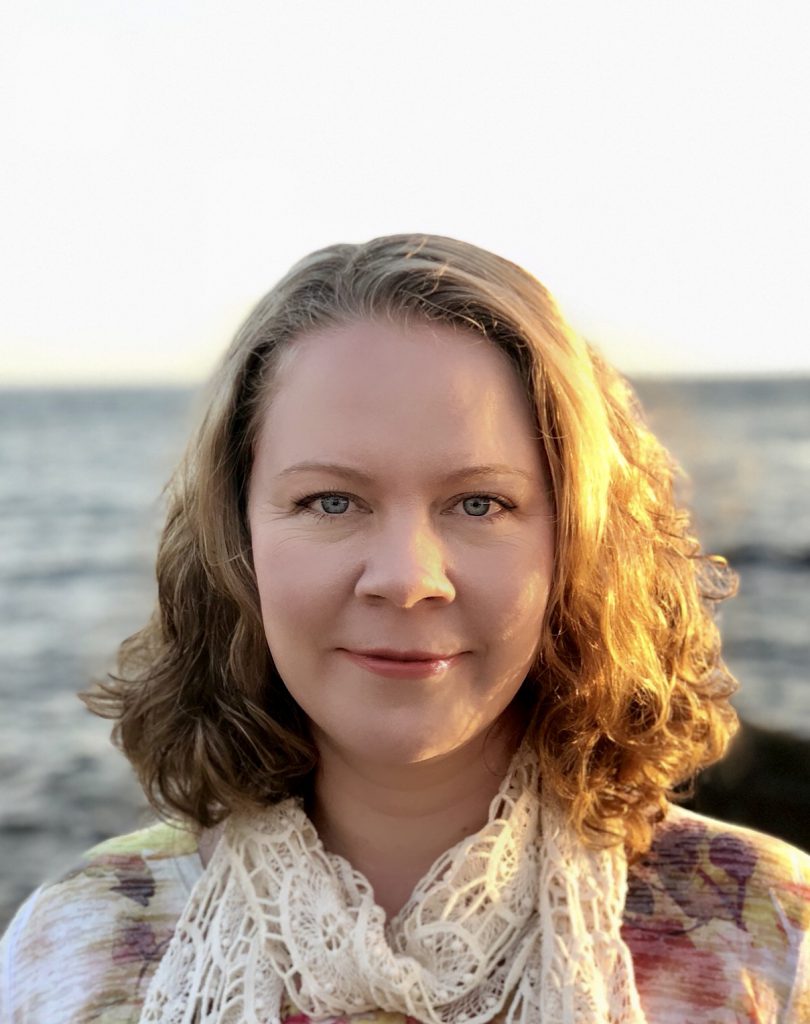
By Juliet Shires Recently, policy interns at Sahiyo have been interviewing members of the Connecticut (CT) Coalition to End FGM/C to learn more about each individual and to better understand all the important work they contribute towards ending FGM/C. The information below comes from an interview between Sahiyo’s former policy intern, Azalieh Erawoc, and CT Coalition member, Jo Keogh. Jo Keogh, a member of the Advisory Board at Sahiyo, is a founding member of the Connecticut Coalition to End FGM/C. She is passionate about issues surrounding the practice of FGM/C due to her background as a mental health counselor working with women with post-traumatic stress disorder resulting from gender-based violence. “Trauma is one of the biggest issues we have to deal with personally, societally, globally,” says Keogh, “I feel that it influences a lot of what is going on in the world today…without systemic change, healing on an individual level becomes impossible for a lot of populations.” Keogh got involved with FGM/C advocacy after reading about how a 2017 Michigan case overturned federal law, resulting in states being responsible for criminalizing FGC and conducting educational outreach. Keogh looked for a Connecticut law to protect those at risk of undergoing the procedure, but there were none. This inspired her to search for any bills about the issue in her state. Eventually, she reached out to Mariya Taher and Sahiyo after seeing their success in Massachusetts, and thus, the Connecticut Coalition to End FGM/C was born. Keogh emphasized the need for better education surrounding FGM/C for meaningful change. “Education is everything,” says Keogh.”In a perfect world, I wouldn’t have a job anymore…I wouldn’t be working with discrimination claims during the day and I wouldn’t be working with traumatized women at night. None of that would be necessary”. Keogh herself admits that at the beginning she didn’t know much about FGM/C, assuming it was a practice that didn’t occur in today’s world, let alone in the United States. “95% of what I know now about FGM/C, I didn’t know at the beginning. I just knew I didn’t want it to happen in my state…like me, the mass majority of people in this country have no idea what’s going on.” Keogh emphasizes the need for better education around FGM/C, explaining that many people ignore issues with an “it doesn’t affect me” attitude. The key is finding a way to educate people in a way that sticks and doesn’t just become a social “cause of the moment” to enact long-lasting change. Furthermore, Keogh recognizes how non-survivors of FGM/C should use their privilege to better educate themselves. She highlights her experiences of “shutting up and observing” when speaking with survivors in order to learn more about how FGM/C has affected others. Keogh has learned we shouldn’t make generalizations when speaking to survivors, and understands that not all women view their experiences as negative (for example, some women who have undergone FGM/C wear their experiences as a badge of honor). Not everyone will agree with the notions you may possess and it is important to remember that when doing this work, any advocacy “always, always, always must be survivor-centered.” Keogh also discussed the importance of mental health for advocates trying to improve laws around FGM/C. “I think sometimes with advocacy there’s this sense to be “on” all the time […] and to keep fighting until it’s done,” she says. “And I think it’s really important to give ourselves permission to tag out for periods of time without feeling guilt or that we’re “not doing enough.” “It’s important to figure out how much of yourself you can give at any point in time and to honor that,” she continues. “And not have guilt around that. If we come into the fight with a quarter of ourselves we’re just going to get knocked out. So, if we have to tag out, it’s ok. We can always come back in. It doesn’t mean we don’t care, it doesn’t mean we’re not passionate, it just means that we’re human”. Keogh encourages anyone who wants to be involved to participate knowing everyone has a unique set of skills to bring to the Coalition: “All of us have a particular constellation of knowledge that nobody else on the planet has. Advocating from that place is, I think, really powerful”. Looking forward, Keogh is optimistic about the future of legislation in Connecticut and the work ahead of the Connecticut Coalition. “What I’m seeing is women legislators, specifically, getting angry… Anger is one of my favorite emotions. I think anger is the emotion that is the closest to love, because we only get angry about what we value, [so if] they’re angry about it, it means they value the issue. They value the idea that women and girls should have protections against being cut in this state. Passivity is the death of an issue.” We would like to thank Jo Keogh for taking the time to sit down with our policy intern and for her continued work with the CT Coalition. To see the other interview spotlights we’ve conducted click here. Want to get involved? Visit https://endfgmcinct.com/ for more information or contact the CT Coalition Volunteer with Sahiyo Sign the petition to end FGM/C in CT
Building Support for the Connecticut Coalition to End FGM/C After Failure in 2024 Legislative Session

By Juliet Shires In the 2024 legislative session, the Connecticut Judiciary Committee failed to raise a bill that would protect children from female genital mutilation/cutting (FGM/C). Rep. Jilian Gilchrest (D) would have sponsored the bill to create educational and outreach programs, issue civil remedies for survivors, and make FGM/C a clear criminal offense in the state. This marks the need for renewed efforts to build a stronger coalition to address this issue in legislation. Zehra Patwa, a survivor of FGM/C, U.S Advisory Board member for Sahiyo, and CT resident outlines the disappointment many feel at the negligence of not raising this bill despite widespread support: “I’m extremely disappointed that, despite strong support from both sides of the aisle, the bill to protect girls was not raised this session. Protecting the bodily integrity of girls could not be more important especially as we know, anecdotally, that the practice of FGM/C thrives in secret. This bill would have protected girls from the practice but also would have cared for those who have undergone this practice. Not having this bill pushed through puts girls and women in danger and tells them “You are not important”. That is unacceptable in my opinion.” The Connecticut Coalition to End FGM/C was formed in 2020 by individuals who were concerned about Connecticut being only one of nine states without legislation banning the practice of FGM/C. One such Connecticut resident included Jo Keogh, a psychotherapist who worked with organizations such as Sahiyo and the U.S. End FGM/C Network to form the original Coalition: “About 95% of what I know now about FGM/C, I didn’t know at the beginning [of the coalition]. I just knew I didn’t want it to happen in my state,” says Keogh. Furthermore, there was fear that Connecticut could become a “safe haven” for people seeking to perform FGM/C from neighboring states in which FGM/C is illegal. The CT Coalition aims to bring an end to the practice of FGM/C in the state by advocating for a holistic bill that includes educational outreach and input from the community, including those impacted by the FGM/C, such as survivors. One way the Coalition has garnered support for a bill is through a Change.org to ban FGM/C which has received over 80,000 signatures since its start in 2018. The recent failure in the Connecticut legislature has shown the continued need for the Coalition’s continued work. Over 2,600 girls are at risk of undergoing FGM/C in Connecticut, despite it being globally considered a human rights violation. We need to urge the legislature to prioritize the passage of legislation surrounding FGM/C by calling on your representatives in Connecticut to take action in the next legislative session. Want to get involved? Visit https://endfgmcinct.com/ for more information or contact the CT Coalition Volunteer with Sahiyo Sign the petition
Calling on the CT legislature to protect girls from FGM/C
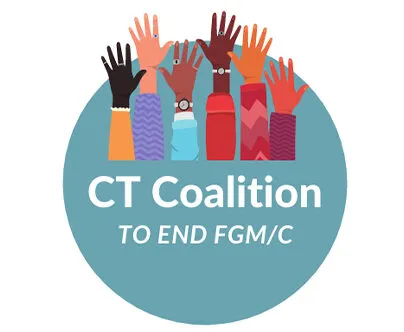
A bill to protect children from female genital mutilation/cutting (FGM/C) in Connecticut (CT) has not been raised by the Connecticut Judiciary Committee in the 2024 legislative session. This news comes as a shock to many survivors of FGM/C and anti-FGM/C activists who have been campaigning for the bill to be introduced. The bill would have been sponsored by Rep. Jilian Gilchrest (D), and would have created education and outreach programs, issued civil remedies for survivors, and created better access to healthcare for survivors of FGM/C. Additionally, the bill would have made it clear that FGM/C is a criminal offense in Connecticut. Currently, Connecticut is only one of nine states left in the U.S. that have no explicit legal protections against FGM/C. Over 2,600 girls are at risk of experiencing FGM/C in Connecticut. Around the country, over half a million women and girls are at risk or are survivors of the practice, according to the Centers for Disease Control and Prevention. Additionally, Connecticut is surrounded by states that have outlawed the practice including New York and Massachusetts. By not following suit, Connecticut could become a safe haven for people who are seeking to practice FGM/C on girls from other states where the practice is illegal. Let’s urge the Connecticut legislature to prioritize the passage of this crucial legislation because every girl deserves to grow up safe and empowered. Join us in advocating for the protection of girls from female genital mutilation/cutting (FGM/C) by calling on your representatives in Connecticut to take action. Your support is crucial in safeguarding the rights and well-being of vulnerable children in Connecticut. Sign this call to action now! For more information, please visit the CT Coalition website.
Legislative Roundtable held in Connecticut to discuss FGC
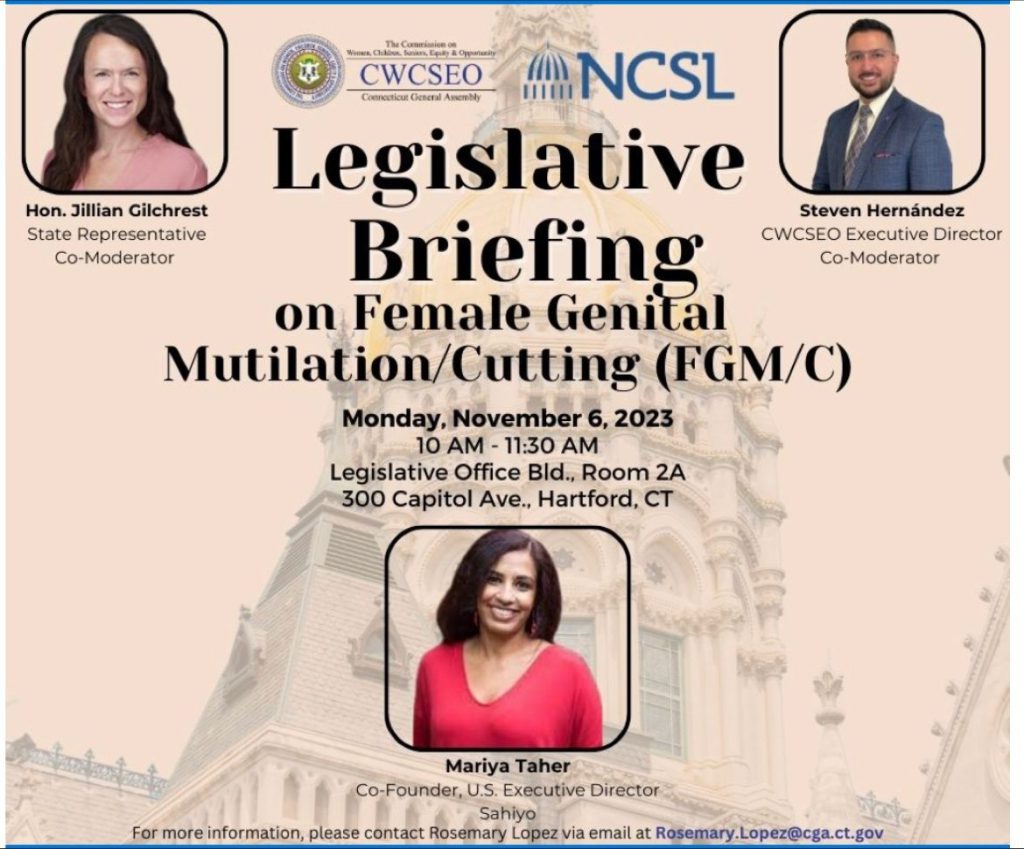
On November 6th, Sahiyo, as part of the Connecticut Coalition to End FGM/C, supported a legislative briefing on the topic of female genital cutting (FGC) hosted by the Commission on Women, Children, Seniors, Equity and Opportunity (CWCSEO) and Connecticut Representative Jillian Gilchrest. Special guests included Mariya Taher, Co-Founder and U.S. Executive Director of Sahiyo, as well as experts from the National Conference of State Legislatures (NCSL). Connecticut remains one of only 9 states in the U.S. yet to address this human rights violation in any manner; this briefing provided insights into the legislative landscape surrounding FGC in the U.S., as well as progress made, challenges faced, and how to move forward in addressing FGC. NCSL also summarized the laws addressing FGC in the 41 states. The Connecticut Coalition to End FGM/C will continue to advocate for a bill to be introduced into this next legislative cycle, starting in January 2024, in hopes that CT legislation will recognize the need to promote a safer, healthier future for all in the state. Learn more about Sahiyo’s policy work here.
Roundtable on Systems Change to Address FGM/C Perspectives from State and Municipal Coalitions – a virtual event
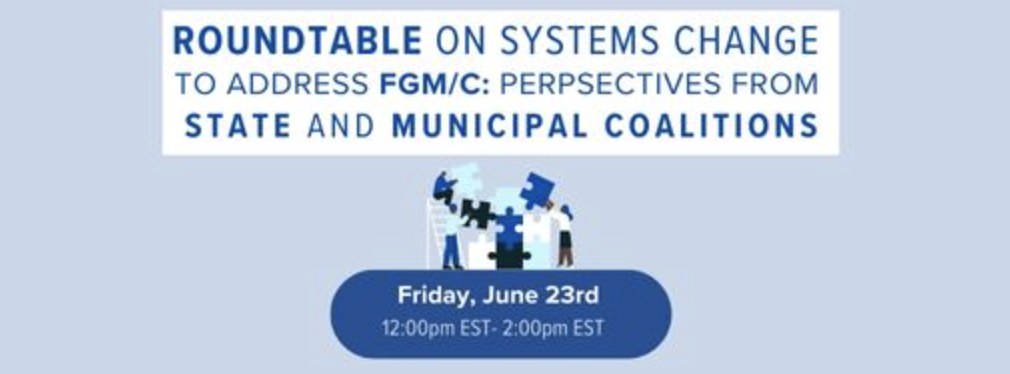
On June 23rd, RTI’s Addressing Female Genital Mutilation/Cutting Training and Technical Assistance Project (AFTTAP) team organized the event Roundtable on Systems Change to Address FGM/C Perspectives from State and Municipal Coalitions. The roundtable featured state and municipal coalitions and working groups from across the United States that work to address FGM/C domestically. Sahiyo U.S. Executive Director Mariya Taher facilitated a panel discussion during the roundtable and featured coalition representatives came from Washington State, Connecticut, New York City, Minnesota, Greater Los Angeles, and Massachusetts. Panelists were able to provide insight into their initiatives, processes, and provide ideas on how they would like to see the prevention, support work, and advocacy surrounding FGC expand. Some coalitions focused more on advancing legislation on FGC while others focused on raising awareness of FGM/C. Joanne Golden, a Sahiyo U.S. Advisory Board member and founding member of the Massachusettes Coalition, spoke about the coalition’s success in passing state legislation to address FGC in August 2020. Preventing and responding to FGM/C requires effective collaboration across systems and this roundtable; overall, this event created a dialogue for U.S. based coalitions to discusses effective forms of collaboration for the future in the hopes of ending FGM/C in this country.
